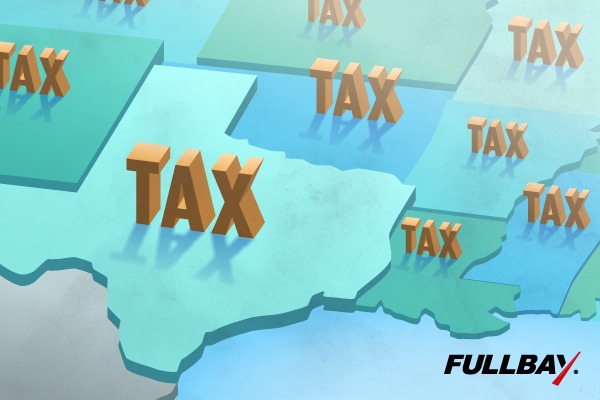Sorting Out Sales Tax for Heavy Duty Shops

There are three elements of running a business, two of which many of us never think about. The first one is actually doing the work – easy enough to imagine. Then there’s managing staff and keeping them fairly happy, which is an entire blog post on its own. But then there’s handling administrative work: the “back office” stuff that, to be frank, makes a lot of us wince.
Yes, folks, today we’re talking about sales tax.
Keeping on top of licenses, fees, and taxes is a full-time job requiring extreme organizational skills. Heavy-duty shops in particular are subject to a range of different taxes. This can include state sales tax (unless you do business in one of the few states that don’t tax retail sales). If you’re in one of the 45 states that do charge sales tax, the rules for sales tax on parts aren’t all the same.
You can probably already see that you’ve got a lot of information to work through. We’re providing some basic information for you here, but it’s critical to consult a lawyer or an accountant to get the scoop on the sales tax laws in your particular region. We’ll say it again: Talk to a professional before embarking on your own sales tax adventure. This post is just an introduction and does not constitute legal advice.
With that out of the way, let’s talk taxes!
State Sales Taxes
First things first: Sales tax isn’t a tax your shop owes as part of doing business. Instead, it’s a tax consumers pay on things they buy. It’s just more efficient to have businesses collect and pay the taxes to the state, rather than having every individual citizen file a report on items they purchase.
If you’re living in one of these five states, congratulations! No sales tax for you:
- Oregon
- New Hampshire
- Montana
- Delaware
- Alaska
If you live anywhere else…you will probably charge, report, and pay taxes on goods (and sometimes services) sold. The tax rates range from 2.9 percent to 7.25 percent, depending on the state.
Do I Charge Sales Tax on Parts Used In Repairs?
You’ll charge sales tax on parts sold directly to a customer, such as wiper blades or a filter, as these are obviously retail goods sold to a consumer. But you’ll probably run into people who wonder why you’re charging sales tax on parts that you end up using in a repair or service. So here it is, the tragic (for some) truth: Sale tax needs to be paid on those parts, regardless of whether they purchase them separately or during the repair.
Your shop can collect the sales tax in one of two ways.
First, let’s say your shop buys wholesale parts and doesn’t pay sales tax at the time of purchase. That makes you responsible for collecting sales tax when you use those parts on a customer’s truck. You also need to report that sale and pay the tax to your state.
In some cases, if you pay sales tax when you purchase parts, the vendor you bought from will report the sale and pay the tax to the state. In that case, you won’t charge sales tax when you install the part for your customer.
The actual laws will vary by state, so like we said, make friends with a professional before taking any action!
What Else Gets Taxed?
It’s not just the parts and services that get taxed. In states with sales tax, you also have to collect tax on the supplies used in repairs and services, including:
- Brake and transmission fluid
- Motor oil
- Bearing grease
- Solvents and thinners
Since they’re part of a repair or service you perform on a customer’s vehicle, you charge sales tax for them just like you would for a part.
Bear in mind that you won’t charge sales tax on items like cleaning supplies, sandpaper, drop cloths, and shop towels. Since these are related to the upkeep of your shop, you are the end user, and you paid the sales tax on the items when you purchased them.
Taxing Labor
So you can tax parts and supplies. What about labor?
There’s a lot to unpack when it comes to labor. A lot of it comes down to your state or region, so once again, we implore you to get your individual scoop from a lawyer.
In general, you collect sales tax on material goods sold, but not necessarily on services.
But Fullbay, you may be thinking, that means charging sales tax on parts but not on the labor to install them, right?
Not necessarily. There are always exceptions to the rule. In Idaho, for example, labor for repairs isn’t taxable, so a typical repair bill would only include sales tax on the parts used but not on the labor. But if your shop fabricates a part to complete the repair, the labor for manufacturing that part is taxable.
What’s more, in some states like Texas, repair shops are required to charge sales tax on labor to install accessories. That means if a heavy-duty shop in the Lone Star State puts something like a security system or satellite radio in your truck, you’ll pay sales tax on both the parts and labor.
Yeah, it’s kind of complicated. We did say talk to a lawyer or accountant before doing anything, right?
Repair Vs. Remodel
Some states differentiate between repair work and remodeling. The reasoning goes like this: repair work fixes or corrects what is broken or disabled, while remodeling is modifying the original vehicle. Installing a lift or lowering kit or doing work that improves a truck’s performance, for instance, is remodel work.
In many states, including Texas, the labor for remodeling is taxable. Therefore, you must charge tax on the labor along with sales tax on parts used in the job.
Taxing Core Charges
Core charges can make even the most seasoned among us wince. But yes, in many states they’re taxable just like any other parts in states with sales tax.
A core charge is built into the price of a replacement part. The owner can ship the old part back to the manufacturer to obtain a refund on that charge, whatever it may be. Basically, it incentivizes recycling.
You’ll figure tax on the total parts price, then subtract out the core refund. Your shop will account for the full price of the core – not the price after the refund – in the sales report to your state and pay state sales tax on it.
Other Taxable Charges and Fees
Even if your state doesn’t require taxing labor along with charging sales tax on parts, you’ll still want to find out how you should handle non-repair services. For instance, New York expects heavy-duty shops to charge tax to tow a disabled truck. Even if you’re not transporting it to your shop, you still need to tax the towing fee.
The exception to that rule is if the truck is not broken down or undrivable. Examples would be towing a perfectly good semi from one yard to another or hauling off a repossessed truck. Additionally, if you charge clients a storage fee for trucks left at your shop, the Big Apple requires you to tax that fee, too.
Many shops charge environmental fees, but should they be taxed? They’re a service, in a way, but they’re not linked to one specific element of the repair work you do for any given customer. Instead, they’re a way to help pay for properly disposing of used products. Usually, sales tax isn’t charged on environmental fees, but it’s always best to check with your state tax office to be sure.
Don’t Forget to File
So you’ve collected sales tax. Great! Make sure you inform the relevant authorities.
When you open a retail business in a state that requires sales tax, you’ll need to apply for a resale license. The state will issue you a seller’s permit with a sales tax number on it and you’ll report your sales to the state regularly.
Smaller businesses that don’t have a lot of sales may only have to report quarterly, but most heavy-duty repair shops will have to file a report monthly, as well as pay the taxes due on the sales each month.
One last piece of advice for you: While we’ve provided some specific examples, we want to stress once again that tax laws vary from state to state and from city to city. Always consult a professional to ensure you fully understand when you can charge sales tax on parts and labor in your state. Not knowing the law isn’t an excuse. Whether or not you collect sales tax correctly, your state will still expect you to pay the correct amount. Learn what to tax and how much to tax – it’s absolutely worth it to protect your bottom line.

